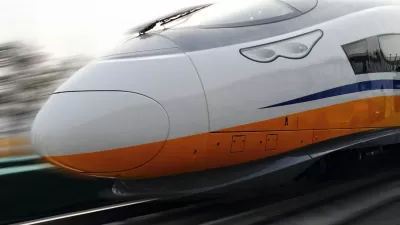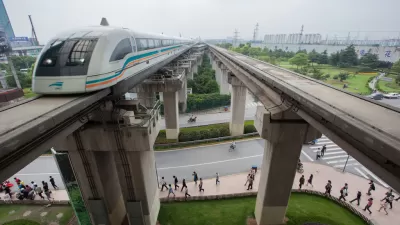Tsunami, earthquakes, and nuclear radiation in the past, Japan proceeds to build a magnetic train that defies Newton's laws of physics.
Sarah Laskow of Good Magazine reports that the Central Japan Railway has been authorized and funded to construct a maglev train that connects Tokyo-Nagoya-Osaka.
Maglev technology "channels magnetic force to levitate the train almost four inches above the track and propel it forward at speeds over 300 miles per hour," explains Laskow. In the U.S. context, the commute from NYC to D.C. will take less than an hour.
Having ridden in one of the test trains, Secretary of Transportation LaHood concedes: "I have to say, those trains are fast. Very fast."
The $112 billion project will be completed in 2027.
FULL STORY: Japan Will Build Blazingly Fast Tokyo to Osaka Maglev Train

Planetizen Federal Action Tracker
A weekly monitor of how Trump’s orders and actions are impacting planners and planning in America.

Maui's Vacation Rental Debate Turns Ugly
Verbal attacks, misinformation campaigns and fistfights plague a high-stakes debate to convert thousands of vacation rentals into long-term housing.

San Francisco Suspends Traffic Calming Amidst Record Deaths
Citing “a challenging fiscal landscape,” the city will cease the program on the heels of 42 traffic deaths, including 24 pedestrians.

Amtrak Rolls Out New Orleans to Alabama “Mardi Gras” Train
The new service will operate morning and evening departures between Mobile and New Orleans.

The Subversive Car-Free Guide to Trump's Great American Road Trip
Car-free ways to access Chicagoland’s best tourist attractions.

San Antonio and Austin are Fusing Into one Massive Megaregion
The region spanning the two central Texas cities is growing fast, posing challenges for local infrastructure and water supplies.
Urban Design for Planners 1: Software Tools
This six-course series explores essential urban design concepts using open source software and equips planners with the tools they need to participate fully in the urban design process.
Planning for Universal Design
Learn the tools for implementing Universal Design in planning regulations.
Heyer Gruel & Associates PA
JM Goldson LLC
Custer County Colorado
City of Camden Redevelopment Agency
City of Astoria
Transportation Research & Education Center (TREC) at Portland State University
Jefferson Parish Government
Camden Redevelopment Agency
City of Claremont




























